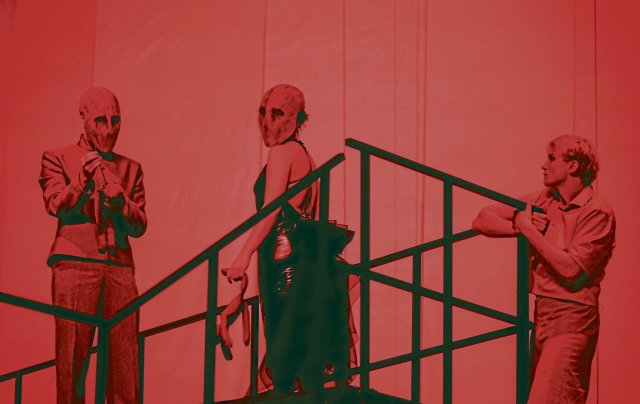With masks in the red light: Moralist Fabian (Anton Nürnberg) lives in turbulent times.
Photo: Arno Declair
Dr. Jakob Fabian turns his back on the war. He, who has previously danced through the piece in his elegant white trousers, is now standing, staring rigidly to the side, facing away from the audience. He seems to be listening, but doesn’t want to see anything. No smoke. No bombs. No impressions of the morning of February 24, 2022. He stands there as if he had nothing to do with the horror that the ensemble is describing on the ramp and remains silent.
Sometimes silence covers up pure cold-heartedness. Sometimes it is the only way to survive – as in the case of Erich Kästner, author of the novel “Fabian or The Walk to the Dogs”. Instead of going into exile, he remained in Germany throughout the Nazi period, watching the burning of his books, which were defamed as “un-German,” while he continued to work in the entertainment genre under a pseudonym. The silence, writes ZEIT editor Peter Neumann in a review of Dominik Graf’s film essay “Everyone writes for themselves,” was something Kästner looked at throughout his life: “This crouched, squat, pent-up thing that at some point no longer finds an outlet but sinks, heavy will be like coagulated lava.” Is Dr. Fabian Jakob an alter ego of Kästner? Many interpretations suggest this, including Philipp Arnold’s production at the Munich Volkstheater.
nd.DieWoche – our weekly newsletter

With our weekly newsletter nd.DieWoche look at the most important topics of the week and read them Highlights our Saturday edition on Friday. Get your free subscription here.
Fabian (Anton Nürnberg) is a blank slate at the beginning of the evening. Very youthful, very blonde and wearing very white clothes, he romps with his friend Labude (Pascal Fligg) around the “fairground” of Berlin, through bars, nightclubs and brothels in the early 1930s. Or, the late 1910s? Early 2020s? Philipp Arnold and dramaturge Hannah Mey have created a play version of Kästner’s “Fabian” that leaves room for jumps in time in the form of inserted foreign texts. Arna Aley (born in Lithuania), Viktor Martinowitsch (Belarus) and Maryna Smilianets (Ukraine) have, as the program says, “reacted” to Kästner’s work in literary terms. While “Fabian” takes place during the Weimar Republic, when the First World War was still fresh in many people’s bones, Martinowitsch and Smilianets confront us with the reality of today’s war in Ukraine in autobiographically based texts. So they’re all parallel narratives that need to be managed in a staged manner.
»The time is far too big, it is that big. / It grows too quickly. It will make her feel bad. / You measure it every day and think with trepidation: / Time has never been as big as it is today.” These lines from Kästner’s poem “Great Times” give the production a timeless framework. In what era of the 20th and 21st century did people not think: Things can hardly get any worse? The stage (Viktor Reim), which with its scaffolding and suspended circular horizon is somewhat reminiscent of the Berliner Volksbühne under Frank Castorf (who staged “Fabian” at the Berliner Ensemble in 2021), gives free rein to the post-dramatic assembly work that follows.
Surrounded by big city scenes from the 1930s, which cheerfully paint over the authoritarian forces that were already emerging in the wake of hyperinflation (Video Sebastian Pircher), Fabian and Labude begin their wrangling for socio-political positions. Change people first or the system first? Labude, the activist, stands for a revolutionary left-wing program: “It is our task to reform the continent.” The moralist Fabian is concerned with decency and reason. “What good is the system as long as people are pigs?”
Yes, what use is it? Since humans only have limited ability to reason in exceptional situations, all Fabian can do is observe, disturbed, and remain silent. On a stage that is becoming increasingly barren, as if the textual interventions from Ukraine and Belarus were displacing the big city atmosphere, he is becoming more and more of an onlooker. Until Irene Moll, Kästner’s male brothel owner (Nina Steils), brings everyone who has “drifted away” back to reality with a cheerful “slap on the bottom.”
From here the furious part of the production begins. While Kästner’s novel sound alternated rather bumpily with Martinowitsch and Smilianet’s “eyewitness reports”, the ensemble picks up speed with Arna Aley’s literary contribution. In grotesque costumes made of crystal chandelier hats, flower bouquet sleeves and jester jackets (Julia Dietrich), a group of Erzgebirgsbahn travelers are mercilessly torn from their daydreams. From a “denial of reality,” as Aley writes, “that has become mainstream.”
“It’s always easier to close your eyes to what you can’t handle,” says Smilianets’ final monologue. But is the diagnosis correct? Is there silence in the face of the war in Ukraine? Who is the accusation directed at? Here the production remains unclear. Dominik Graf, who created a brilliant film version of “Fabian” in 2021, focused entirely on his protagonist (Tom Schilling), portraying him as a person who was not up to his time because he believed too much in reason. He is drowning. The Munich evening, on the other hand, ends with a request: “Learn to swim!” It is aimed at everyone.
Next performances: December 22nd, December 23rd, January 7th, January 30th
Subscribe to the “nd”
Being left is complicated.
We keep track!
With our digital promotional subscription you can read all issues of »nd« digitally (nd.App or nd.Epaper) for little money at home or on the go.
Subscribe now!
